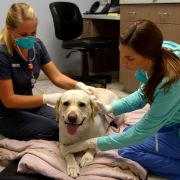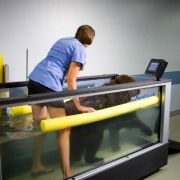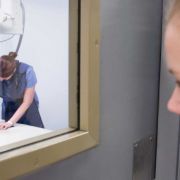Date:
By Alan Green and Carly Conrad
A disease that is a true killer both in dogs and cats is one transmitted by mosquitoes. Here in the Lowcountry we have our fair share of these annoying and potentially deadly insects. It gives me great pleasure this month to introduce one of CVRC’s outstanding and highly skilled emergency doctors, Dr. Carly Conrad. Dr. Conrad has written an important and detailed piece on heartworm disease. I would urge all of the readers to educate yourselves on the disease and preventive measures you can take to protect your furry family members.
It’s summer time in South Carolina and the mosquitoes are out in force. With the increase in bug population so comes the increase in heartworm infections in dogs and cats. Dirofilaria immitis (heartworm) is a blood-borne parasite that infects dogs and cats and has been found in all 50 states. Heartworm is a serious disease that may affect any dog or cat, even those that live exclusively indoors. Mosquitoes are adept at sneaking in through cracks in the window or open doors.
Heartworms are blood-borne parasites that are transmitted by mosquitoes. Once a mosquito bites a pet, the immature form of the parasite migrates and matures through the body, ultimately coming to live in the heart and lung blood vessels. It takes about six months for the worms to develop fully in the body; once mature they can live for five to seven years, reproducing and sending out microfilaria (baby heartworms) into the blood. End-stage heartworm disease is an emergency situation called caval syndrome, where pets go into multi-organ failure and right-sided heart failure from the large numbers of worms backing up the vena cava and right side of the heart.
In general heartworm infections in dogs will present first with a cough, then further develop on to exercise intolerance, fainting, new heart murmur and abdominal distention. Treating a heartworm infection is intensive, expensive and has risks. Treating adult heartworm infections is only for dogs. Treating the heartworms does not clear the damage that the parasite has done to your dog’s heart and lungs. Dogs have to go on heartworm prevention for the rest of their lives as treatment does not impart immunity.
Heartworm treatment starts with diagnostics to determine the severity of the disease, a month-long prep of a tetracycline antibiotic (doxycycline or minocycline commonly) and starting heartworm preventative before starting the adulticide treatment. The antibiotic helps weaken the heartworms by attacking symbiotic bacteria called Wolbachia that lives inside the worms. Diagnostics generally include blood work to evaluate organ function, chest x-rays to check the heart and lungs for damage and an echocardiogram to look for damage in the heart and to estimate worm burden. Affected dogs then get two or three injections of melarsomine, combined with three months of strict cage rest, anti-inflammatories and continuing heartworm preventative. Treatment totals out at four months of intensive visits with your veterinarian, medications and hospitalization. This includes strict cage rest as an absolutely essential part of treatment. Adult worms and microfilaria die off during these four months and exercise will increase the risk of stroke and pulmonary thromboembolism (stroke to the lungs). If a pet’s heartworm infection goes untreated then they can be at risk for caval syndrome, which is a life threatening situation requiring surgery and hospitalization. If a dog goes through emergency surgery for caval syndrome, then they will still need to go through the adulticide injection treatment.
Feline heartworm disease varies greatly from canine heartworm disease. Most cats do not show clinical signs of heartworm infection but the ones that do show more asthma-like symptoms and are at higher risk for complications from the parasites, having severe respiratory distress from even single worm infections. Cats are commonly treated with steroids and monitored for spontaneous cure. This works for cats as they generally only carry very low burdens of heartworms.
Prevention is more cost effective as well as benign to the pet. There are a multitude of heartworm preventatives available through your family veterinarian. Preventatives range from pills to topical medications to biannual injections. Heartworm prevention is necessary year-round in the South as the weather rarely sustains temperatures cold enough to kill off mosquitoes. It is incredibly important to continue prevention as directed by your family veterinarian as just one missed dose can result in a heartworm infection in your beloved pet.
A great reliable resource to answer any questions you have about heartworms is the American Heartworm Society; find them online at heartwormsociety.org.


















